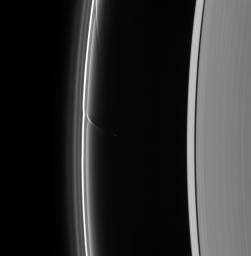The Hand of Prometheus
Caption:
A shepherd moon can do more to define ring structures than just keep the flock of particles in line, as Cassini spacecraft images such as this have shown.
Prometheus (102 kilometers, or 63 miles across) is seen here with two long streamers of material that it has pulled out of the F ring. When Prometheus comes close to the F ring in its orbit, the moon's gravity tugs on the ring particles. The disturbed particles, now pulled into orbits slightly closer to Saturn and therefore faster, shear out during successive orbits, creating the long and delicate streamers seen here.
This view looks toward the unlit side of the rings from about 31 degrees above the ringplane.
The image was taken in visible light with the Cassini spacecraft narrow-angle camera on Sept. 29, 2006 at a distance of approximately 1.7 million kilometers (1 million miles) from Prometheus and at a Sun-Prometheus-spacecraft, or phase, angle of 160 degrees. Image scale is 10 kilometers (6 miles) per pixel.
Background Info:
The Cassini-Huygens mission is a cooperative project of NASA, the European Space Agency and the Italian Space Agency. The Jet Propulsion Laboratory, a division of the California Institute of Technology in Pasadena, manages the mission for NASA's Science Mission Directorate, Washington, D.C. The Cassini orbiter and its two onboard cameras were designed, developed and assembled at JPL. The imaging operations center is based at the Space Science Institute in Boulder, Colo.
For more information about the Cassini-Huygens mission visit
http://saturn.jpl.nasa.gov/home/index.cfm
. The Cassini imaging team homepage is at
http://ciclops.org
.
Cataloging Keywords:
| Name |
Value |
Additional Values |
| Target |
Prometheus |
F Ring, Saturn, Saturn Rings |
| System |
Saturn |
|
| Target Type |
Satellite |
Planet, Ring |
| Mission |
Cassini-Huygens |
|
| Instrument Host |
Cassini Orbiter |
|
| Host Type |
Orbiter |
|
| Instrument |
Imaging Science Subsystem (ISS) |
|
| Detector |
Narrow Angle Camera |
|
| Extra Keywords |
Grayscale, Visual |
| Acquisition Date |
|
| Release Date |
2006-11-06 |
| Date in Caption |
|
|
| Image Credit |
NASA/JPL/Space Science Institute |
| Source |
photojournal.jpl.nasa.gov/catalog/PIA08303 |
| Identifier |
PIA08303 |

 Planetary Data System
Planetary Data System
